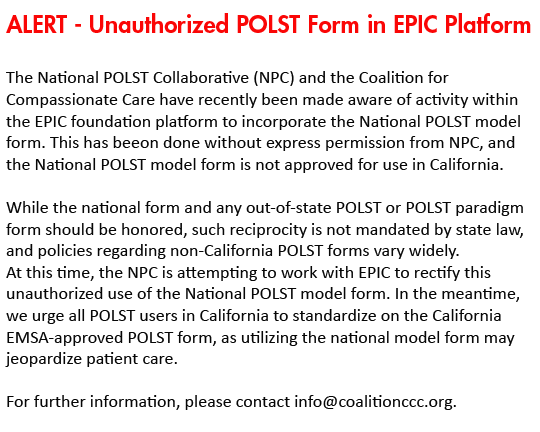February 1, 2024

 The Coalition for Compassionate Care of California is the home for POLST in California.
The Coalition for Compassionate Care of California is the home for POLST in California.
POLST (Physician Orders for Life-Sustaining Treatment) is a medical order signed by both a patient and physician, nurse practitioner, or physician assistant that specifies the types of medical treatment a patient wishes to receive toward the end of life. POLST is a tool that encourages conversation between providers and patients about their end-of-life treatment options, and helps patients make more informed decisions and communicate their wishes clearly. As a result, POLST can prevent unwanted or medically ineffective treatment, reduce patient and family suffering, and help ensure that patient wishes are followed.
Download the POLST form, tools, and resources at www.caPOLST.org.
Learn more about National POLST at polst.org.
An Overview of the Coalition for Compassionate Care of California’s (CCCC) POLST Implementation Initiative
Implementing Physician Orders for Life Sustaining Treatment (POLST) in a state as large and diverse as California is a formidable task. Despite many barriers, however, use of POLST has spread throughout the state – due in large part to CCCC and volunteers in 27 local coalitions.
CCCC and its partners spread POLST in one of the largest, most diverse states faster than any other state in the country. Within the first five years, California had legislation establishing POLST in state statute, 27 community-based coalitions working on POLST at a local level, a standardized two-day curriculum on the POLST conversation, a statewide taskforce of stakeholders, a website, and educational materials in a range of languages. By 2012, 95% of California nursing homes had completed POLST forms with residents, 65% of hospitals had a formal POLST policy, and 75% of assisted living facilities had implemented POLST education for staff.
The successful implementation of POLST is the result of CCCC’s unique ability to bring together people with a passion for advance care planning, and spark ideas into action through collaboration and the growth of community-based coalitions. The following is a brief overview of CCCC’s activities and accomplishments that have helped make POLST a reality in California.